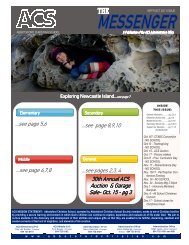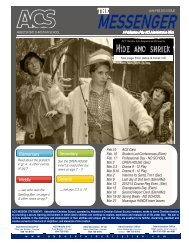Science Curriculum Map Grades K â 12 - Abbotsford Christian School
Science Curriculum Map Grades K â 12 - Abbotsford Christian School
Science Curriculum Map Grades K â 12 - Abbotsford Christian School
- No tags were found...
You also want an ePaper? Increase the reach of your titles
YUMPU automatically turns print PDFs into web optimized ePapers that Google loves.
Planning for Assessment (Teaching Strategies), Assessment Indicators (Assessment Activities) and resources are listed in course overviews<br />
Grade Essential Questions/Unit Questions Content / Enduring Understandings Learning Outcomes: By the end of grade level, the students will: Special Events:<br />
Field Trips, Service Projects, Speakers,<br />
Culminating Activities, etc.<br />
Biology<br />
11<br />
Taxonomy<br />
Why have taxonomy systems<br />
What characteristics separate the various<br />
phyla<br />
What is a dichotomous key<br />
How are organisms separated into various<br />
groups<br />
Evolution and Creation<br />
What is evolution<br />
How and in what ways does evolution occur<br />
How can our <strong>Christian</strong> faith and evolution<br />
intertwine<br />
Who was Charles Darwin<br />
Ecology<br />
How are all living organisms interconnected<br />
How do man’s activities affect the<br />
sustainability of organisms<br />
What is our role in managing the creation<br />
Bacteria and Viruses<br />
How are bacteria well suited to survive in<br />
many environments<br />
How do bacteria reproduce<br />
What are antibiotic resistant bacteria and how<br />
do they become that way<br />
How do bacteria act as decomposers<br />
Are viruses alive or living<br />
What tools do we have to fight disease<br />
How do our bodies ward off disease<br />
Plant Biology<br />
How have algae adapted to live in water<br />
How have plants adapted to live on land<br />
How is moss more complex than algae<br />
How are ferns more complex than moss<br />
What adaptations do ferns have that give them<br />
a survival advantage over moss<br />
What adaptations do gymnosperms have that<br />
give them a survival advantage over ferns<br />
What adaptations do angiosperms have that<br />
give them a survival advantage over<br />
gymnosperms<br />
What types of plants do we have where we<br />
live<br />
Animal Biology<br />
What are the life functions of the various<br />
animal phyla<br />
What characteristics are unique to each<br />
animal phylum<br />
How are evolutionary processes evident in the<br />
Taxonomy<br />
What is taxonomy<br />
How are animals classified<br />
Dichotomous key<br />
How are living things organized<br />
Evolution and Creation<br />
DNA structure<br />
Scientific Method<br />
Agents of evolutionary change<br />
Divergent, convergent evolution and speciation<br />
<strong>Christian</strong> perspective presentations<br />
Ecology<br />
describe the process of ecological succession, with reference to terms such<br />
as pioneer species and climax community<br />
explain the roles of producers, consumers, and decomposers in ecosystems<br />
describe a pyramid of energy in terms of energy flow through an ecosystem<br />
describe the roles of photosynthesis and cellular respiration within a pyramid<br />
of energy<br />
compare photosynthesis and cellular respiration in terms of the reactants,<br />
products, and chemical equations<br />
describe the stages a population goes through as it increases in size, with<br />
reference to terms such as exponential growth, logistic growth, cyclic growth,<br />
carrying capacity, steady state<br />
describe density-dependent and density-independent factors that limit and<br />
control population growth<br />
define symbiosis and types of symbiosis: parasitism, commensalism, and<br />
mutualism<br />
Bacteria and Viruses<br />
What are bacteria<br />
Antibiotic resistant bacteria<br />
Bacteria lab<br />
Viruses<br />
Pandemic<br />
Bacterial or viral diseases<br />
Plant Biology<br />
Why plants<br />
Algae<br />
Alterations of generations<br />
Moss<br />
Ferns<br />
Gymnosperms<br />
angiosperms<br />
Animal Biology<br />
Body plans and systems<br />
Porifera<br />
Cnidaria<br />
Processes of <strong>Science</strong><br />
A1 demonstrate safe and correct technique for a variety of laboratory procedures<br />
A2 design an experiment using the scientific method<br />
A3 interpret date from a variety of text and visual sources<br />
Taxonomy<br />
B1 apply the Kingdom system of classification to study the diversity or organisms<br />
Evolution<br />
C1 describe the process of evolution<br />
Ecology<br />
D1 analyse the functional inter-relationships of organisms within an ecosystem<br />
Microbiology<br />
Viruses<br />
E1 evaluate the evidence used to classify viruses as living or non-living<br />
E2 evaluate the effects of viruses on human health<br />
Kingdom Monera<br />
E3 analyse monerans as a lifeform at the prokaryotic level of organization<br />
E4 evaluate the effectiveness of various antibiotics, disinfectants, or antiseptics on<br />
bacterial cultures<br />
Plant Biology<br />
F1 analyse how the increasing complexity of algae, mosses, and ferns represent an<br />
evolutionary continuum of adaptation to a land environment<br />
F2 analyse how the increasing complexity of gymnosperms and angiosperms contribute<br />
to survival in a land environment<br />
Animal Biology<br />
G1 analyse how the increasing complexity of animal phyla represents an evolutionary<br />
continuum<br />
G2 analyse the increasing complexity of the Phylum Porifera and the Phylum Cnidaria<br />
G3 analyse the increasing complexity of the Phylum Platyhelminthes, the Phylum<br />
Nematode, and the Phylum Annelida<br />
G4 analyse the complexity of the Phy.um Mollusca, the Phylum Echinodermata, and the<br />
Phylum Arthropoda<br />
G5 relate the complexity of the form and function of vertebrates to the evolutionary<br />
continuum of animals<br />
Animal Biology<br />
Field trip to the Vancouver Aquarium
















